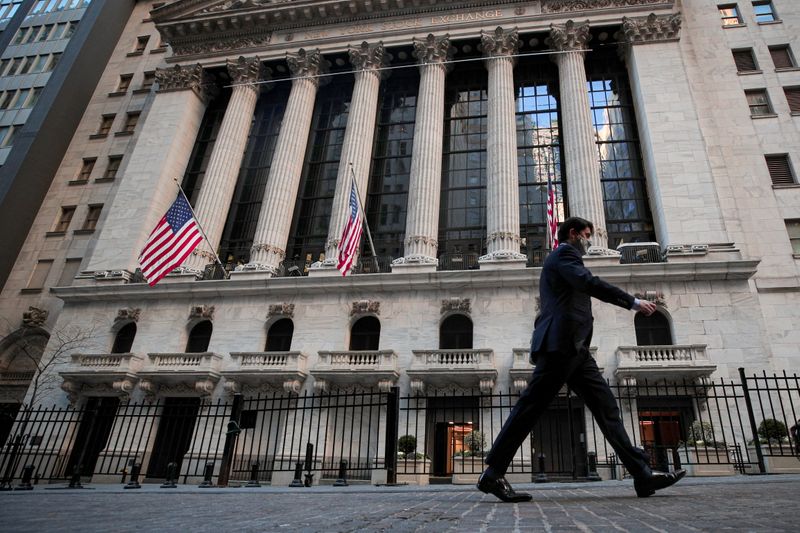NEW YORK (Reuters) -Wall Street was on track to close at record highs on Monday, but crude prices lost ground as long-awaited pandemic relief and Brexit trade deals fueled investors’ risk appetite.
U.S. equities followed the example of their European counterparts with a broad rally, and communications services and consumer discretionary stocks were leading the charge.
But crude prices slumped as weak demand and a potential increase in production offset the effects of the fiscal aid package.
President Donald Trump reversed course on Sunday by signing a $2.3 trillion stimulus and spending package into law, heading off a potential government shutdown and setting the stage for congressional Democrats to push for more robust direct payments of $2,000 to millions of Americans.
“Stocks are riding the coattails of the additional stimulus program and that is for good reason,” said Terry Sandven, chief equity strategist at U.S. Bank Wealth Management in Minneapolis. “If you look to year-end, it will be a fairly light trading week but we seem poised to end the year on a high note.”
While Wall Street still faces some uncertainties, Sandven sees conditions remaining favorable as we enter 2021.
“Medical progress for COVID-19 continues to evolve and that will unfold at a more accelerated rate now as you get into the new year,” Sandven added. “And importantly, the macro environment is favorable for stocks.”
Britain reached a trade agreement with the European Union on Thursday, days before leaving one of the world’s largest trading blocs, and urged businesses to prepare for disruptions resulting from the completion of Brexit.
The Dow Jones Industrial Average rose 235.6 points, or 0.78%, to 30,435.47, the S&P 500 gained 36.57 points, or 0.99%, to 3,739.63 and the Nasdaq Composite added 124.46 points, or 0.97%, to 12,929.20.
European shares had their strongest close in 10 months and German shares hit an all-time high on U.S. stimulus and Brexit trade deals.
The ongoing rollout of coronavirus vaccines also buoyed sentiment, with Pfizer Inc announcing it expects to complete distribution of 200 million doses in Europe by September.
Markets in Britain were closed on Monday in observance of the Boxing Day holiday.
The pan-European STOXX 600 index rose 0.66% and MSCI’s gauge of stocks across the globe gained 0.62%.
Emerging market stocks lost 0.19%. MSCI’s broadest index of Asia-Pacific shares outside Japan closed 0.18% lower, while Japan’s Nikkei rose 0.74%.
U.S. Treasury yields rose early in the session but gave up much of those gains by late afternoon as the risk-on rally lost some steam.
Benchmark 10-year notes last fell 2/32 in price to yield 0.9364%, from 0.93% late on Thursday.
The 30-year bond last fell 6/32 in price to yield 1.6743%, from 1.666% late on Thursday.
The dollar was essentially flat against a basket of world currencies but the euro gained strength as investors priced out Brexit risk.
The dollar index rose 0.01%, with the euro unchanged at $1.2204.
The Japanese yen weakened 0.34% versus the greenback at 103.86 per dollar, while Sterling was last trading at $1.3449, down 0.73% on the day.
Crude prices dropped as the prospect of increased OPEC+ output in the face of weak demand dampened stimulus cheer.
U.S. crude dropped 1.26% to settle at $47.62 barrel. Brent was last at $50.92 per barrel, down 0.72% on the day.
Gold reversed its early gains as the dollar recovered its losses amid the stocks rally.
Spot gold dropped 0.1% to $1,874.00 an ounce.
(Reporting by Stephen Culp in New YorkAdditional reporting by Danilo Masoni in MilanEditing by Matthew Lewis)

























